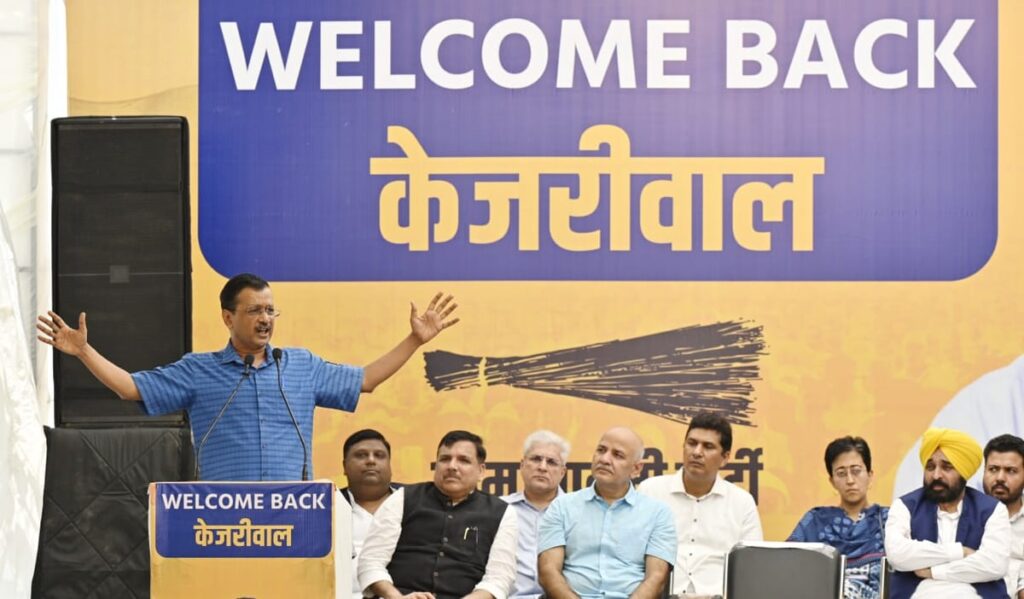In a dramatic and strategic political maneuver, Delhi Chief Minister Arvind Kejriwal has announced his resignation, seeking a fresh mandate from the electorate in the upcoming Assembly elections. While this move is touted as an act of political transparency and accountability, it raises a significant question: Why did Kejriwal choose to resign but not dissolve the Delhi government and push for early elections? Instead, he has opted to step down while keeping the structure of the Aam Aadmi Party (AAP)-led government intact. Let’s delve into the strategic reasons behind Kejriwal’s decision and explore whether this gamble could turn the tide in the 2025 Delhi Assembly elections.

Positioning Himself as a Victim of Political Vendetta
At the core of Kejriwal’s resignation is a calculated move to position himself as a victim of political vendetta. By resigning and framing his exit as a response to the alleged persecution by central agencies, Kejriwal seeks to rally public support against the Modi government. This approach mirrors the tactics used by various opposition leaders in the past, such as Mamata Banerjee and Uddhav Thackeray, who have also claimed victimhood in the face of central scrutiny.
But does this narrative of political persecution resonate with Delhi’s electorate? By positioning himself as a martyr fighting against an oppressive regime, is Kejriwal hoping to build a broad coalition of anti-BJP sentiment? If successful, this could energize his base and shift the focus from governance challenges to a broader battle for democratic values.
Turning the Election into a Personal Referendum
Kejriwal’s resignation is more than a symbolic act; it turns the upcoming election into a personal referendum on his leadership and integrity. By asking the people of Delhi to decide whether he is “innocent or guilty,” he transforms the election into a verdict on his personal credibility rather than AAP’s governance record.
In this context, how will voters perceive Kejriwal’s appeal? Will they view it as a genuine act of accountability, or as a strategic ploy to deflect attention from the party’s governance issues? This reframing could potentially shift the narrative in Kejriwal’s favor, turning the election into a high-stakes personal contest.
Challenging BJP’s Momentum
The timing of Kejriwal’s resignation is strategically significant. After the BJP’s sweeping victory in Delhi’s seven Lok Sabha constituencies in 2024, Kejriwal’s move may be an attempt to disrupt the BJP’s momentum. By resigning now, Kejriwal could be aiming to shift the focus from the BJP’s national successes to local issues where AAP has traditionally performed well.
Can this shift in focus slow down the BJP’s momentum? Will Kejriwal’s resignation force the BJP to address Delhi-specific issues rather than relying on its national narrative? If successful, this strategy could potentially weaken the BJP’s stronghold in Delhi and provide AAP with a renewed opportunity to connect with voters.
Calling for Early Elections
Kejriwal’s demand for early elections, scheduled for November 2024 instead of February 2025, adds another layer of strategy. By pushing for early elections, Kejriwal aims to capitalize on current momentum and avoid a protracted period of scrutiny over AAP’s governance. However, this request places him in a complex position: while early elections could benefit AAP by maintaining political momentum, there’s no guarantee the Election Commission will comply.
Why didn’t Kejriwal dissolve the government to ensure early elections? The delay in elections could potentially give the BJP more time to consolidate their position and shape the narrative. By not dissolving the government, Kejriwal retains some control over the timing and can continue pressing for an early election date.
Tapping into Anti-BJP Sentiment
Kejriwal’s resignation also serves as a strategic move to tap into the widespread anti-BJP sentiment. By portraying his resignation as a stand against BJP’s alleged authoritarianism, Kejriwal hopes to galvanize opposition voters and build a coalition against the ruling party.
Will this strategy succeed in uniting the fragmented opposition vote? The 2024 general elections saw a significant BJP victory, but by aligning himself with broader opposition narratives, Kejriwal could potentially harness discontent against the BJP. This approach could be pivotal in rallying support and shifting voter sentiment in AAP’s favor.
Reframing His Image
Resigning from the Chief Ministership allows Kejriwal to reframe his image and address the criticisms of his leadership. After facing governance challenges and electoral defeats, this move provides him with an opportunity to refresh his public persona.
Can this image makeover counteract the negative perceptions surrounding his leadership? By stepping down and seeking a fresh mandate, Kejriwal aims to shed past controversies and present himself as a leader committed to transparency and accountability. This rebranding could be crucial in regaining voter trust and support.
Pre-emptive Move to Set the Tone
Kejriwal’s resignation is a pre-emptive move designed to control the narrative leading up to the elections. By stepping down, he aims to keep himself at the center of the media spotlight and set the tone for the election campaign.
Is this a strategic masterstroke or a risky gamble? The 48-hour delay before his official resignation ensures that media coverage remains focused on him, but it also gives rivals time to counter his narrative. How will this impact the overall election dynamics?
Rallying the Party Base
Kejriwal’s resignation is also a rallying cry for his party. Amidst recent legal troubles and internal challenges, this move is intended to energize AAP’s base and unify the party. By framing his resignation as an act of sacrifice, Kejriwal aims to boost party morale and consolidate support.
Will this strategy successfully rally AAP’s core supporters? The emotional appeal of his resignation could galvanize loyalists, but it also raises questions about internal party cohesion and readiness for the upcoming elections.
Shift to a Presidential-Style Campaign
Kejriwal’s resignation signals a shift from a policy-driven campaign to a more personalized, presidential-style contest. By making the election about his leadership rather than AAP’s governance record, Kejriwal aims to focus the campaign on his personal credibility.
Will this personalized approach resonate with voters? While it allows Kejriwal to sidestep governance issues, it also opens him up to scrutiny over his leadership style. How effective will this shift be in mobilising voter support?
Testing Public Sentiment
Ultimately, Kejriwal’s resignation is a test of his personal popularity. After AAP’s defeat in the 2024 general elections, this move is a chance to reset the narrative and gauge whether Kejriwal’s local appeal remains strong.
Can Kejriwal recapture the popularity that once propelled him to power? The upcoming election will be a crucial test of his influence and ability to connect with Delhi’s voters, despite recent setbacks.
Arvind Kejriwal’s Calculated Decision: Why He Resigned but Didn’t Dissolve the Delhi Government
In a dramatic political move, Delhi Chief Minister Arvind Kejriwal has announced his resignation while opting not to dissolve the Delhi government. Instead, he will leave the AAP-led government intact, with a new Chief Minister to be selected from within the party. This decision raises several strategic questions:
1. Risk of Opposition Parties Poaching MLAs and Forming a Government
One significant reason for not dissolving the government is to avoid the risk of opposition parties, particularly the BJP, attempting to poach AAP MLAs and form a new government. Recent instances in Karnataka and Madhya Pradesh demonstrate how governments can fall due to defections. By keeping the government intact, Kejriwal minimizes the risk of such maneuvers and maintains stability within Delhi’s administration.
2. Testing Loyalty Within AAP
Kejriwal’s decision to resign while overseeing the selection of a new Chief Minister is also a strategic move to test the loyalty of AAP MLAs. In light of recent legal troubles, this process helps identify which members remain aligned with Kejriwal and who may be inclined to defect. This approach strengthens party unity and ensures internal discipline ahead of the elections.
3. Avoiding Governor’s Rule and BJP’s Interim Control Over Delhi
Dissolving the Delhi government would lead to Governor’s Rule, with the LG, aligned with the BJP, taking over the administration. This scenario could allow the BJP to frame narratives against AAP and capitalize on governance gaps during the interim period. By maintaining an AAP government, even with a different Chief Minister, Kejriwal prevents the BJP from exploiting this opportunity and keeps control of Delhi’s administration.
4. Controlling the Election Timing
By not dissolving the government, Kejriwal retains some control over the election timeline. The Election Commission has discretion over when to schedule elections, and dissolving the government might lead to delays. By keeping the government in place, Kejriwal can continue advocating for early elections while ensuring that AAP remains in power during the critical months leading up to the campaign.
5. Preventing Internal Fragmentation and Maintaining Cohesion
A sudden dissolution could lead to internal fragmentation within AAP, with some MLAs and leaders feeling unprepared for an immediate election campaign. By stepping down but maintaining the government structure, Kejriwal ensures a smooth transition and allows the party to manage internal dynamics effectively.
6. Strategic Positioning for the Campaign
Kejriwal’s resignation allows him to focus entirely on campaigning. Stepping away from the Chief Minister’s role provides him with the flexibility to engage directly with voters, address their concerns, and counter the BJP’s narratives. This strategic positioning enables him to build his campaign narrative without being bogged down by day-to-day governance issues.
Conclusion
Arvind Kejriwal’s decision to resign while keeping the Delhi government intact is a multifaceted strategy designed to navigate political challenges and prepare for the 2025 Assembly elections. By testing MLA loyalty, preventing opposition manipulation, and maintaining control over the election timing, Kejriwal aims to strengthen AAP’s position and influence the electoral narrative. As the political landscape evolves, only time will tell if this bold move will propel him back to power or lead to unforeseen consequences. The 2025 Delhi Assembly elections will undoubtedly be a defining moment for Kejriwal and AAP, setting the stage for a high-stakes political battle.

